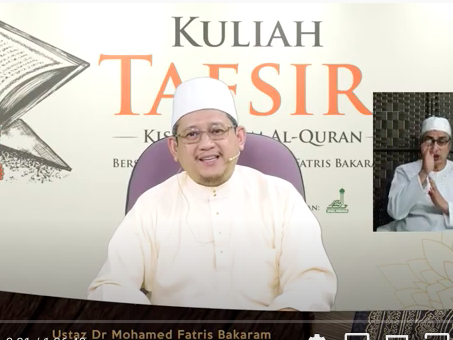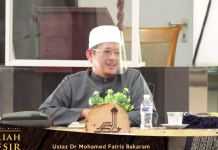بسم الله الرحمن الرحيم
Bismi-llāhi r-raḥmāni r-raḥīm
In the name of Allah, Most Gracious, Most Merciful
اللهم صلي على سيدنا محمد وعلى اله وصحبه وسلم
Allahumma salli ala Sayyidina Muhammad wa ala alihi wa sahbihi wasallim
O Allah, send your peace and blessings upon our Master Muhammad and upon his family and companions
Lessons from Surah An-Nur (Verses 5 to 10)
This article is a summary of takeaways from Ustaz Dr Mohamed Fatris Bakaram’s Tafsir Online Lecture on 6th December 2020. Summaries of previous lectures on Surah Maryam, Surah Taha, Surah Al-Anbiya’ and Surah Al-Hajj can be found here. The previous lecture of Surah Al-Mu’minun can be found here.
Addressing Topics from the Previous Lecture
In the previous lecture, we spoke about how important preserving the human dignity is in Islam. We spoke of the harsh penalties given not only to those who commit Zina, but also to those who accuse people of committing Zina without having sufficient evidence to support their claim.
We mentioned how the execution of the punishment is the responsibility of the ruling authority – it is not something that can be done by just anyone.
Fiqh Rulings for Caning
There have been requests asking me to go deeper into the Fiqh rulings regarding caning for those who commit Zina or those who wrongfully accuse people of committing Zina.
My response to these requests is that I will not be going in-depth into these matters because these lectures are not meant to be dealing with Fiqh rulings. There are conditions that need to be met first, be it for the accuser or the accused.
There are conditions to be met regarding the object of the accusation itself. This is an exceedingly long discussion by Fiqh scholars. This is not the focus of our lectures; this is not a Fiqh or Islamic law series. What I relay to you is what I think is sufficient to know, regarding the verses that we will cover, specifically about verses of the Qur’an that are linked to stories.
I also mentioned how the caning process is one that is not meant to hurt the perpetrator. The intent is to give a reminder and to bring the perpetrator and the people of the community awareness of the seriousness of the offense.
Some people say I did not give enough details regarding how the punishment is to be carried out. I think I have mentioned quite a bit. The caning should not be one that threatens a person’s life, it should not hurt him excessively.
The cane should not be too hard or too soft. The caning should not be too light such that it can hardly be felt, and it should not be too heavy such that there is irreversible damage.
If you see the kind of caning that is being done in our criminal justice system today, you will know that each whipping can lead to the person’s skin being torn. In Islam, this is not allowed.
The hits should not be applied to an existing wound, or to a person’s private parts, or to vulnerable body parts that can be damaged leading to death; for example, the neck cannot be lashed. The person being hit should not be made to lie down, bend over, or crouch during the caning process.
Males should be standing while females should be seated. The person’s clothes should not be removed – do you see how this is different from the corporal punishment of today? The Aurat of the perpetrator, male or female, remains covered throughout this process.
Rasulullah SAW even mentioned that the person who executes the caning cannot lift the cane higher than his head until his armpits are completely revealed. His arms cannot be held so close to his body that his armpits are completely covered as well.
This is how caning is done in Islam. The intent is not to hurt. If the perpetrator becomes weak out of pain, the caning is to stop immediately, and the session will resume at another time until he has met the total number of strokes of caning that he is sentenced with.
In fact, there are cases where someone is healthy enough to be caned, but not to the extent of getting caned with a hundred strokes – due to factors such as age and health. In these cases, multiple canes can be tied into a bundle of 100 canes, and a single hit by this bundle can count as an equivalent to 100 strokes of one cane; such is the exception given, to make sure that the offender is not overly hurt in the process of punishment.
Continuation of Verses in Surah An-Nur
Now in Verse 4 of Surah An-Nur, we learnt that whoever who accuses ‘Muhsonaat’, chaste women, of Zina, will be punished severely. Does this apply equally to someone who accuses a chaste man of Zina without sufficient evidence to back his claims up?
Scholars have discussed this and said yes. In Fiqh, we name this act of accusing someone as having committed Zina as “Qazaf”. In Verse 4, we learnt that someone who commits Qazaf must face three consequences:
(1) He will be caned 80 times, (2) His testimony (in court, as a marriage witness etc.) is being rejected forever, and (3) He will be declared as Faasiq, someone who commits sins. This is a three-part punishment; There is a penalty applied (1) physically, (2) socially, and (3) spiritually.
Exceptions to the Punishment of Qazaf
Moving onto Verse 5, we see some exceptions being laid out:
إِلَّا ٱلَّذِينَ تَابُوا۟ مِنۢ بَعْدِ ذَٰلِكَ وَأَصْلَحُوا۟ فَإِنَّ ٱللَّهَ غَفُورٌۭ رَّحِيمٌۭ
Except those who repent afterwards and mend their ways, then surely Allah is All-Forgiving, Most Merciful. [24:05]
Scholars discuss the implications of repentance and self-betterment on the perpetrators of Qazaf. Do these two conditions override the three penalties? Scholars differ in their opinion of this issue.
Most scholars say that Taubah and self-betterment does not nullify the punishment of 80 strokes of the cane. This is the stance held by almost all scholars, except for Imam Al-Sya’bi who, in his book, states that a perpetrator who repents and makes amends will be spared from the cane. As this is a very minority opinion, scholars do not take it into account.
Some scholars say that someone who repents and makes amends, then only the third penalty (being a Faasiq) is removed. Someone who makes repentance, will have his repentance accepted by Allah SWT and he will no longer be considered a Faasiq, someone who disobeys Allah SWT. This is the opinion held by Imam Abu Hanifah.
The opinion held by Mazhab Shafi’i and Maliki holds that someone who repents and makes amends will have the penalties of Faasiq and rejected testimony be removed; only the penalty of the 80 strokes of cane remains.
Explanation of the Differences in Opinion for this Verse
Why are there so many different opinions for the interpretation of a single verse? As a layperson, would we not be confused as to which opinion to follow? My brothers and sisters, this is out of the Wisdom of Allah SWT.
Why did Allah send down his Syariat like this? Why did Allah SWT choose certain words in His verses that will bring about openings for different interpretations? Could Allah SWT not have sent down a single, very precise verse, where only one possible interpretation exists?
Allah could have if he wanted. But Allah SWT chose not to. As a result, we have inherited many different opinions from scholars of different schools of thought. Some say we have four ‘Mazhab’s, some say we have five, some say we have more than a dozen Mazhab – some of which still exist today, while some others no longer exist because there is no one continuing the legacy.
For example, there is the Mazhab of Imam Al-Auza’ie, a valid Mujtahid and scholar. His Mazhab no longer exists because he did not have any students who chose to continue his school of thought. This is out of Allah’s delicate design, enabling human beings to continue thinking, learning and deepening their understanding in matters of the religion and in mastering the Qur’an that was revealed to them.
So, if you see, Imam Abu Hanifah, he says that only the ‘Faasiq’ ruling is removed. He uses a method where the word ‘except’ in the Qur’an only goes back to the nearest phrase to it in a string of phrases. So, if we say, “Ali like eating rice, Osman likes eating fish and Bakar likes eating noodles except that which is steamed.”, then the exception does not apply to Ali or Osman, it applies only to the noodles.
So, in the case of Verses 4 and 5, Imam Abu Hanifah says that only the last of the three penalties will be nullified. As you can see, the interpretation of the verses of the Qur’an has logic and reasoning behind it, it is not done in a haphazard manner.
Imam Shafi’i and Maliki do not consider verse 4 and 5 as a single sentence; Imam Shafi’i considers them as separate. So, when “except” is used in Verse 5, he considers it as applying to the whole of Verse 4.
If the exception applies to the whole of Verse 4, then the both the penalties (2) and (3) are nullified. Why is (1) not nullified? Because (1) is a law, once the judge has declared it, it becomes a responsibility that needs to be carried out.
Modern Application of Fiqh Ruling According to Context
These are the methods that are used by Fiqh scholars as a basis when interpreting the verses of the Qur’an. Coming up with Islamic rulings is not something that can be done randomly.
Therefore, we need to respect the opinions of the scholars that we inherit as part of our rich heritage of Islamic knowledge. Scholars of today dive into the opinions of scholars of the past in order to find the rulings that best fit the present situation and circumstances of the present day.
Even as a follower of Mazhab Shafi’i, we look at what is applicable today. Within the Mazhab, there are some rulings that we do not practice today. For example, according to Mazhab Shafi’i, Zakat Fitrah needs to be paid in the form of staple food.
As Asians, our staple food is rice. Hence, in theory, according to Mazhab Shafi’i, we need to pay our Zakat in the form of rice grains. There are other Mazhab that hold different opinion. In today’s context, based on the present situation, needs and surroundings, we choose to follow another opinion.
Collecting Zakat payment in the form of rice grains would bring about much difficulty in terms of collection, storage, payment, distribution and meeting the needs of the recipient – people may not need rice as much as they require other necessities.
So today, we respect the opinions of scholars of the past, and look to scholars of the present to find the best solution to fit the current situation.
Stories linked to the Qazaf Verses
There is a story linked to this verse. Imam Ibn Kathir in his book Tafseerul Qur’anil Azhim, when speaking of this verse, cites a hadith narrated by Imam Ahmad.
When the Verse of Qazaf came down, a companion by the name of Sa’ad bin Ubadah, one of the leaders of the Ansar, came to Rasulullah SAW. Sa’ad asked Rasulullah SAW, “Was that how Allah SWT revealed this verse?” or, in other words, “Did Allah really send down that verse?”.
He found it absurd that someone who accuses another of Zina needed to bring four witnesses otherwise they would be punished. Rasulullah SAW turned to his people and asked them, “Is this your leader, O Ansar?”.
The Ansar were embarrassed by the question and relayed to Rasulullah SAW not to take Sa’ad’s comment to heart. They explained that Sa’ad was someone well known for his jealousy. Whenever he would marry someone, he would never marry a widow.
He only married virgins out of his envy, he did not want his wife to be thinking of her past husband while she was with him. If any of his wives were to be divorced, nobody from the Ansar would marry her, knowing his jealousy.
Sa’ad then spoke up and said, “O Rasulullah, I know that this verse is the truth. But I ask because I find it peculiar. If a husband were to find his wife having Zina with another man, would he not be able to do anything O Rasulullah?
Does that man have to go in search of four witnesses to back him up at that point of time? By the time he returns with four witnesses, the act would have been completed.” Rasulullah SAW remained silent to this question as he was not one to add on to the revelation by Allah SWT.
In the narration of Imam Ahmad, a few days followed and then a companion called Hilal bin Umayyah came to Rasulullah SAW saying, “O Rasulullah, I am facing a big issue! When I returned home last night, I found my wife having intimate relations with another man (called Shuraib bin Sahma)”.
Rasulullah SAW, knowing that Verse 4 had already been revealed, replied, “Bring me evidence, or I will carry out Hudud unto you!”. Hilal replied, “What can I do? I was unable to find any witnesses. When it happened, I saw with my own eyes that it happened. There was nobody around. But I swear, O Rasulullah, that I witnessed my wife in the act!”.
Rasulullah SAW repeated, “Bring evidence, or I will carry out Hudud unto you!”. Hilal replied, “O Rasulullah, I swear. And I am certain that Allah SWT will bring to light the truth about me.” He had hoped that Allah SWT will reveal a new verse to aid him. He was not talking about some other woman; he was talking about his own wife.
There were many implications to what has happened, his dignity, marriage, family, happiness, peace of mind, and lineage amongst others were to be affected.
New Verses Revealed for a Husband Accusing his Wife of Zina
With that, by Allah SWT’s Mercy, a new verse was revealed. Allah SWT knew by His Infinite Wisdom not to send all the verses at one go. He SWT had sent down verses 4 and 5 followed by a pause, before this incident happened, and the next verse weas revealed.
If the verses had come down in one chunk, the people of Madinah, still getting used to the new laws being implemented, may not have been able to internalise everything at once. They may have struggled with understanding or putting the verses in practice.
They may not have been able to sort it out into sub-topics of the main topic. So, when the incident of Hilal happened, the following verse was revealed by Allah SWT:
وَٱلَّذِينَ يَرْمُونَ أَزْوَٰجَهُمْ وَلَمْ يَكُن لَّهُمْ شُهَدَآءُ إِلَّآ أَنفُسُهُمْ فَشَهَـٰدَةُ أَحَدِهِمْ أَرْبَعُ شَهَـٰدَٰتٍۭ بِٱللَّهِ ۙ إِنَّهُۥ لَمِنَ ٱلصَّـٰدِقِينَ
And for those who accuse their wives, but have no witnesses except themselves, let the testimony of one of them be four testimonies (i.e. testifies four times) by Allah that he is one of those who speak the truth. [24:06]
وَٱلْخَـٰمِسَةُ أَنَّ لَعْنَتَ ٱللَّهِ عَلَيْهِ إِن كَانَ مِنَ ٱلْكَـٰذِبِينَ
and a fifth oath that Allah’s Curse may be upon him if he is lying. [24:07]
This is what is known as “Li’an” in the Arabic language, where someone invokes the curse of Allah upon himself if he were to be lying. A husband may not have any witnesses besides himself, but it cannot be possible that he will not be allowed to accuse her of infidelity due to the absence of witnesses.
How is a husband supposed to continue showering his wife with love after he had seen what had happened with his own eyes? So, if he were to testify four time and declare the Li’an, then he will be spared from the punishment of Qazaf. The burden now moves onto the shoulders of the wife.
If the wife is unable to defend herself, then the punishment of Zina would be applied to her. Now, if the wife denies that such a thing had happened, saying that she had been sleeping alone and that her husband was making up stories, then she too was asked to do the same.
وَيَدْرَؤُا۟ عَنْهَا ٱلْعَذَابَ أَن تَشْهَدَ أَرْبَعَ شَهَـٰدَٰتٍۭ بِٱللَّهِ ۙ إِنَّهُۥ لَمِنَ ٱلْكَـٰذِبِينَ
For her to be spared the punishment, she must swear four times by Allah that he is telling a lie, [24:08]
وَٱلْخَـٰمِسَةَ أَنَّ غَضَبَ ٱللَّهِ عَلَيْهَآ إِن كَانَ مِنَ ٱلصَّـٰدِقِينَ
and a fifth oath that Allah’s Wrath may be upon her if he is telling the truth. [24:09]
وَلَوْلَا فَضْلُ ٱللَّهِ عَلَيْكُمْ وَرَحْمَتُهُۥ وَأَنَّ ٱللَّهَ تَوَّابٌ حَكِيمٌ
And had it not been for the Grace of Allah and His Mercy on you (there would be a big problem for either of you)! And verily Allah is the One Who accepts repentance, the All-Wise. [24:10]
Now that the court or judge has heard the four testimonies and the oath by the husband, and the four testimonies and the oath by the wife, which side will he take? The judge will then not punish either of them.
What Rasulullah SAW did at that point of time was to separate the husband from the wife permanently, taking away the opportunity of Ruju’ (reconciliation) forever.
Under normal circumstances, a husband who divorces his wife the first time is allowed to reconcile with her for as long as she is not already married. If divorce happens a second time, she can similarly return to him and they can remarry.
But if Talaq (divorce) happens the third time, then reconciliation is impossible except under the condition that the ex-wife remarries and had sexual intercourse with her new husband, then she divorces from her new husband – only then can the ex-husband remarry her. We know all of this.
Under the condition of Li‘an, the judge will separate the husband and wife pair permanently, without any possibility of reconciliation and reunion. Regardless of whether the wife has remarried and divorced multiple times with other husbands, she still can never return to him. The door for reconciliation has been shut.
Shortly afterwards, Hilal’s ex-wife became pregnant. Rasulullah SAW mentioned that the child cannot be claimed to be anyone’s child – neither his biological mother’s valid husband nor the person with whom she had been accused of having sexual intimacy – has any claim of the child as his own.
We do not know which testimony to take, because both parties had made their testimony four times and had made the Li‘an oath. Therefore, neither of the men had any claim over the child’s lineage – the child was to carry his mother’s name.
Rasulullah SAW then declared that neither the child nor the mother could be accused of being linked to Zina. The status of the child as a child born out of Zina is unknown; only Allah knows the truth. Nobody was to ever mention again the child and relate him to Zina.
Making an Oath to Win an Argument
This is so different from what happens in today’s community. People today freely accuse children of being children out of Zina. It is in fact a grave sin to be doing Qazaf.
The difference between Qazaf and Li‘an is that the latter is used on one spouse to another. You cannot use four testimonies and an oath when accusing someone else’s wife. This opportunity is only given to a husband as a way out of a relationship with a wife whom he is sure has committed adultery.
The husband will face immense difficulty caring for and providing maintenance for his wife and children whom he does not think are his own. This is why Rasulullah splits the couple up; it is no longer possible for them to live peacefully together.
In Islam, we have the Li‘an for when a husband accuses his wife of infidelity. Is there a way for someone to Islamically use an oath to claim his rights or wealth of some sort? That is no longer called Li‘an.
I will not go into detail, but that oath is called Mubahalah, inviting someone to swear upon Allah SWT at the risk of receiving Allah SWT’s curse if they were found to be dishonest. There is a narrow scope of usage for this. It cannot be used on just anyone.
There was once a Christian man came to Rasulullah SAW to debate with him SAW saying, “We cannot accept your claim that Jesus is a mere prophet! We know that He is the Son of God.”. The men debated up to the point where Rasulullah SAW could see that the man was making baseless arguments without clarity.
Rasulullah SAW then proposed a Mubahalah, asking Allah SWT to curse whichever party is wrong between them. Rasulullah SAW at that moment had said, let us bring forth all of our family members and make an oath. If either one of us is not telling the truth, then let the curse of Allah be upon us and our family.
The Christian man had with him two men. Upon hearing this challenge, he got fearful and stepped back, unwilling to take the risk. He and his men discussed saying, “We do not know! What if he really is a prophet? Then our entire family will be struck with calamity.”. So, they backed away.
Swearing upon Allah’s name is not something that should be taken lightly. We cannot just go around making oaths here and there trying to prove our point. Only certain leaders, under certain conditions, because of certain Maslahat that need to be fulfilled are offered this option.
This is only done if there is a general good to be gained by the general public. Just as Hudud is only performed by the ruling authority upon perpetrators of Zina and Qazaf, so too is Li‘an only applicable to countries where the ruling authority decides to have it.
As far as I know, there is no country in the world that accepts Li‘an today. This ruling is not applicable in Singapore. Afterall, Li‘an is provided as a way out of being caned, for either accusing or being accused of Zina. Since there is no caning for Zina or Qazaf in Singapore, there is no need to practice Li‘an here.
So why did we spend so much time learning about something that is not applicable? We learn these verses to appreciate that even though the Islamic laws and punishment linked to Zina are not applicable in our present context, we see the seriousness of Zina and accusing someone of Zina as well as the immense impact of a Zina crisis in our household.
That is what we want to focus on today. As a believing community, regardless of what our situation is and how the context shifts, do not ever let Zina become rampant in our community. Be it in committing it, accusing people of committing it, or letting Zina happen in the family context, we need to ensure that Zina is avoided at all costs.
So it turns out, that Sa’ad bin Ubadah’s question was not out of line. Allah SWT had already intended to reveal a more detailed ruling for the context. Allah SWT only revealed that verse after Hilal bin Umayah came with his claim that his wife had committed Zina.
Alternatives to Li’an in the Present Context
Some people ask me then, what can we do in Singapore if we found out that a wife has cheated on her husband? Or a husband does not go to his wife who is Halal for him, and instead goes out looking for the companionship of those who are Haram for him? What happens in the court if they were to bring this issue of infidelity up?
Sometimes in the court, the decision is made against the husband when in fact the wife was at fault. Sometimes the case is won in the interest of the wife when in fact the husband was innocent.
Today, we have the Shari’ah Court that makes decisions based on the laws that exist today as much as possible to bring justice to all parties. This is so that a harmonious marriage can be maintained, and if it can no longer be salvaged, then the split is done in a good and fair way.
At the end of the day, we know that when there is a conflict in the court, the judge must make a decision. Both parties cannot win; whatever the judge’s decision may be, there will always be a party that loses. The judge is human.
A husband can go to court saying he wants Talaq because the wife has cheated on him, or the wife can go to the court asking to be divorced because her husband had been having an affair. Whatever happens, there is no longer any caning or stoning penalty that can be applied here in Singapore in the case of infidelity.
There is no more Li‘an. The judge will still listen and if he concludes that a reconciliation is no longer possible, when the hearts have lost all feelings of affection, when the partners are now incompatible to one another, then the judge will make a decision. In every decision, there will always be a party that loses out.
What Should I Do if I Disagree with the Judge’s Ruling?
There are systems and processes that are in place for you to file a complaint if you do deem that the judgement placed is not just. Follow the system if you want to raise an issue up.
Do not make noise and throw a tantrum, accusing the justice system and the judge, without taking any actions to raise the issue up so it can be addressed. There is usually a deadline in place for you to file a complaint.
Do not wait until that period is over before taking action. And if after filing the complaint, you find that the result is not as you expected, then note that the judge is human. He acts based on the evidence and arguments that are presented to him. Only Allah SWT is 100% Just. Only Allah SWT knows 100% of what there is to know.
The only faultless justice system is the one that will happen on the Day of Judgement when Allah SWT is the Judge. In this world, if after going through the court process, we find that the judge’s decision is not satisfactory to us, then accept that this is what you will get in this world.
Rasulullah SAW said, “Verily, I am a human being. And you bring to me your conflicts for me to reach a resolution for you. I make my judgements based on what is presented to me. There is a likelihood that one of you may be more fluent at relaying your arguments better than the other.
However, note that whoever gets an upper hand in my judgement because of their arguments, but they end up taking the rights of their brother that does not rightfully belong to them, then know that verily what I am giving them is (not their rights, benefit, or happiness, rather they are getting) a slice of the Hellfire.”
This is the situation here on Earth. We are not even talking about a judge in the court. We are talking about Rasulullah SAW. Even someone who receives revelation from Allah SWT says that he makes decisions based on the arguments and evidence presented to him. Even he SAW could be swayed by the arguments of someone who is well-spoken.
So, if the judge has made his decision, and the person receives something that they know is not their right to own, then he should ask himself where his Faith in Allah SWT lies.
You may win in this world because you have chosen a lawyer who is competent and able to convince the judge, however the benefit that you get in the court may only benefit you in this world and bring you misery in the Hereafter. What are a few years of benefit in this world compared to life in the Hereafter?
Someone may know that he is at fault because he was the one who committed adultery, yet he brings to the court evidence after evidence to paint a bad picture of his wife, so that he can gain ownership of the house.
He may live comfortably in the house in this world, even though he knows that he does not have a right upon it because it was he that was at fault. But in the Hereafter, he will have to face the consequences for his oppression.
On the other hand, the person who was oppressed due to the court’s decision against them, even if they may be the one in the right, should follow the proper processes to file a complaint. And if the court’s decision remains, then surrender the outcome to Allah SWT.
Life goes on. There is nothing you can do to change a decision that has been made. You can write to the newspapers and make some noise, but it will not result to anything. Neither the president nor the Mufti has a say in this.
Authority Does Not Override Justice
As a closing, I will share a story to demonstrate that a judge’s decision cannot be overruled by anyone, regardless of what power a person might have. Sayidina Ali RA when he was a Khalifah, had an armoured suit that was taken away unjustly by a Jewish man in Madinah. Sayidina Ali demanded to have it back.
The man said, “What evidence do you have that it belongs to you? It is in my possession! You think that just because you are the Khalifah, you can take things from me?”. They decided to bring the matter to the court. The judge had been assigned by Sayidina Ali. He heard the arguments from both sides before asking Sayidina Ali what evidence he had to support his claim that the armour belonged to him.
Ali RA said, “I have no evidence and witness. I know that it belongs to me, it was taken without my permission and now this man claims that it belongs to him.”. The judge then proceeded to say, “If that is the case, O Khalifah, this armour belongs to him.”.
Sayidina Ali accepted the judge’s judgement. The Jewish man saw in front of his very eyes how the Islamic justice system is. Even though the Khalifah was in the right, he did not use his power to get what he wanted. The judge had made his decision completely based on the evidence that was presented to him. At that moment, the Jewish man said his Shahadah and embraced Islam. He said, “This is how justice is in Islam.”
Conclusion
This is the reality of justice in this world. At times, you may not be treated justly, whatever might happen, continue to live life. Do not let yourself suffer and be caught up in the sufferings of the past. Let go and move on.
Think about the welfare of the children when it comes to divorce. Even if the judgement of the judge may not seem to be fair according to what you see, accept what has happened and make the fullest use of what you have. The ultimate Judgement is in the Hereafter by the Most Just of all judges.
I do not have time to look through the comments of the audience right now, InsyaaAllah, we will address what is necessary in next week’s session. Make du’a for me and for all of your fellow brothers and sisters. May Allah grant us longevity.
May He protect us and grant us good health. May He make firm our faith. Ameen. Until we meet again, my brothers and sisters. Allah SWT bears witness of my sincerity when I say that I really love each of you that Allah SWT has chosen to be my brothers and sisters for the sake of Allah.
——————–
Summary by: Arina Adom
Arina Adom is a lover of learning who takes on the world with an open mind. Resourceful and adaptable, always ready to take on new challenges. Comfortable working with diverse groups of people, yet able to work independently. Thrives under pressure. Currently seeking a meaningful career that enables her to impact lives directly and bring about positive changes in the lives of others in the community.
Arina graduated with a degree in Science ( Hons ), Life Science from NUS. She is currently taking a diploma in Quran and Sunnah Studies from Al Zuhri.
Watch Kuliah Tafsir again at
Masjid Darul Makmur’s Youtube
Watch and follow Kuliah Tafsir weekly
every Sunday after solat Maghrib

organised by Masjid Darul Makmur
Your contributions are appreciated. Get more details by clicking the image below.











